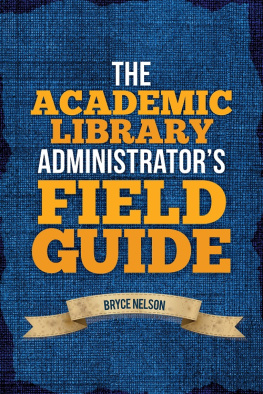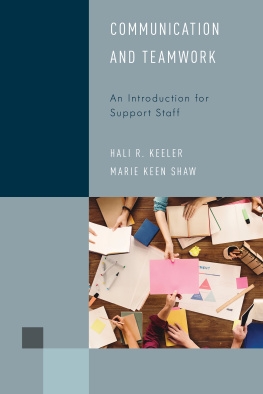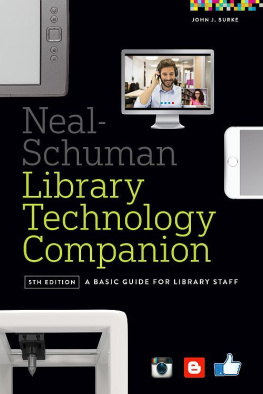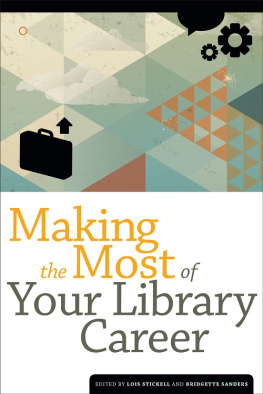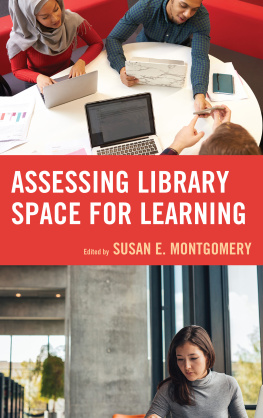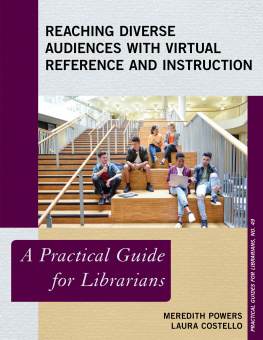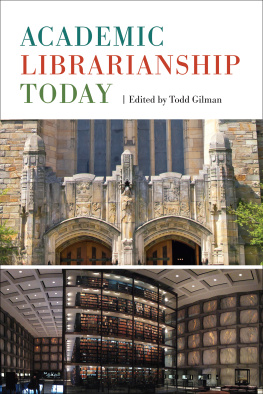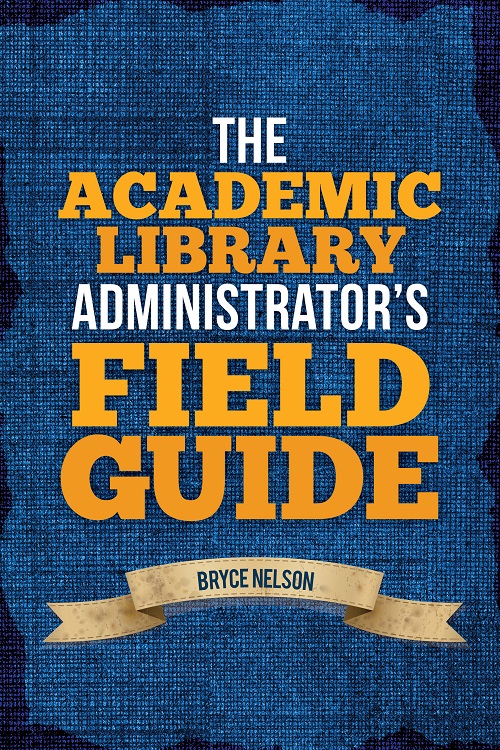
ALA purchases fund advocacy, awareness, and accreditation programs for library professionals worldwide.
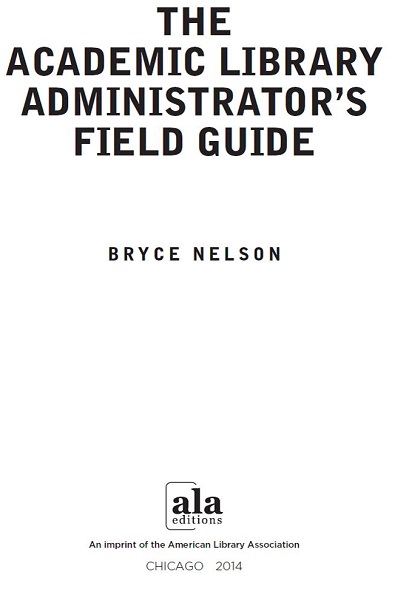
Bryce Nelson, PhD, was University Librarian at Seattle Pacific University and director of the libraries for the Seattle Public Schools. He is affiliate faculty at the University of Washingtons Information School, and Seattle Pacific Universitys School of Education. He holds degrees from Northwestern University and the University of Washington.
2014 by the American Library Association
Extensive effort has gone into ensuring the reliability of the information in this book; however, the publisher makes no warranty, express or implied, with respect to the material contained herein.
ISBNs: 978-0-8389-1223-2 (paper); 978-0-8389-1236-2 (PDF); 978-0-8389-1237-9 (ePub); 978-0-8389-1238-6 (Kindle). For more information on digital formats, visit the ALA Store at alastore.ala.org and select eEditions.
Library of Congress Cataloging-in-Publication Data
Nelson, Bryce Eugene, 1945
The academic library administrators field guide / Bryce Nelson.
pages cm
Includes bibliographical references and .
1. Academic librariesAdministrationHandbooks, manuals, etc. 2. AcademiclibrariesUnited StatesAdministrationHandbooks, manuals, etc. I. Title.
Z675.U5N373 2014
025.1'977dc232014004174
Cover design by Kirstin Krutsch. Images Shutterstock, Inc.
Contents
A number of people read and commented on various iterations of this manuscript, thereby making the resulting book much better than otherwise. I am indebted to all of them for sharing their time, knowledge, and insights: Michael Paulus, Jill McKinstry, Debra Gilchrist, Mark Tucker, Sue Kopp, Dan Bowell, Les Steele, Doug Eriksen, John Bond, Les Foltos, Adam Epp, Dan Johnson, Helene Williams, Tom LaPaze, Dean Erickson, and Clark Johnson. Bonnie Nelson read various versions of this manuscript, and improved the content, writing style, and mechanics. Despite wise counsel and suggestions from these people, the words in this book are mine. I trust that what I wrote is in some way helpful to those who administer academic libraries.
Bryce Nelson
Seattle, WA
T his is a field guide to administering an academic library. It consists of:
topics that matter,
management advice and research,
practical applications, and
citations for further reading.
It is an overview for busy leaders in the field who realistically dont have much time to read, think, and talk about their work. Reading in more depth can occur another time, when not in the field doing daily administration of a library.
Are there lessons from experience, research, and professional standards which will help in the administration of an academic library? There are, and they are found in a wide variety of books, journal articles, websites, blogs, and conversations with experienced administrators. This volume brings together some of these resources.
The topics are grouped in three sections. The first is about the academic library Directors role in positioning the library as a core part of the institutions educational effort. The next section is about managing staff effectively. When the tasks in these sections are done well, then there is a higher chance of success with the tasks in the third section, providing effective library services.
Advice and research on administration needs to be interpreted and evaluated for their usefulness in a specific library and in its college or university. That takes:
Judgment (In what ways is this advice relevant to this place and time?).
Political awareness (What is the political cost of a decision?).
Institutional knowledge (What do the institutions policies and procedures say about this topic?).
Developing judgment, political awareness, and institutional knowledge takes time and appropriate information. This volume is designed to help with that process.
Audience
This book is for academic library administrators:
at any level of experience,
at any level of administration,
in a community college, college, or university of any size,
where research and publication are either valued, or not emphasized, and
in a public or private college or university.
The key variables which separate academic libraries into significantly different variations are the:
size of staff,
relative importance of research, and
amount of money available to the library.
These variables have significant implications for daily practice. Small-staff libraries are very different places from university research libraries. Nevertheless, this field guide has advice and readings of use to administrators who work in such a wide variety of situations.
This field guide should especially help a new administrator make decisions, decide when to act, and determine what to defer. An academic library administrator is new for the first two or three years in that position. Some aspects of the job take several years to learn or influence: for example, the budget cycle. Additionally, there is so much to learn and do in the first year that there is a tendency to become overwhelmed, or overwhelm some of the staff. A new administrator might refer to this field guide on numerous occasions, but need not feel compelled to deal with all topics in it.
After some years of experience, a library administrator may want to rethink some basic assumptions and approaches used in the library. For example:
Librarian turnover may provide chances to hire for very different roles.
The campus political context may change with new leadership.
New technology may alter space, budget, or personnel needs.
Student learning preferences and faculty assignments could alter the role of the library in learning outcomes.
A veteran administrator might reconsider some aspects of library operation and use this field guide differently than a new administrator.
An administrative field guide is also useful for a library Directors supervisor, both as an overview of the Directors responsibilities and as an aid in guiding conversations. A college or university spends a considerable amount of money on its library. Top administrators want to know how and how well that investment fits into the schools overall teaching, learning, and research agendas. The Director needs to be part of the academic leadership team and demonstrate how the library is part of these agendas. This field guide can help the Director and supervisor talk about how the library is part of the institutions academic life.
This field guide would be useful as an external voice in an ongoing conversation between a Director and supervisor. If a Director has a coach/mentor then this field guide would help in that process. A library management class might also use parts or all of it.
Definitions
Within the community college, college, and university sectors there are multiple terms used to describe similar positions. For consistency and simplicity, I have chosen to standardize terms. The word I use may be different from that used on your campus.
Administrator
The terms administrator, manager, and leader are all used in this book. The term administrator refers to those people in a library whose job duties include both managing and leading. They could be the Dean, Associate Dean, University Librarian, Director, Associate Director, or department head. When any administrator acts as a manager, the person is accountable for the conditions under which others work and the quality of their work. When an administrator provides leadership, that person asks if a task, service, or person is necessary, leads an evaluation, and then uses his or her influence to make a change.
Next page
